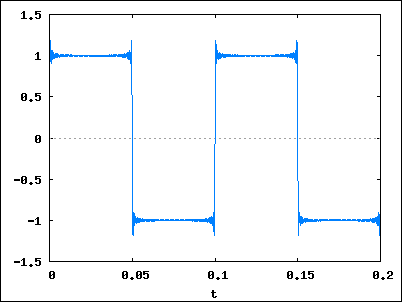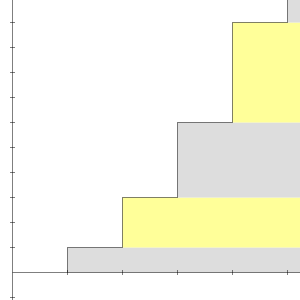Do divergent series converge in reality ?
Divergent series
"In mathematics, a divergent series is an infinite series that is not convergent, meaning that the infinite sequence of the partial sums of the series does not have a finite limit". [source 1]

the series of 1 - 1 + -1 + 1 .... to infinity never converges, thus, it is called a 'divergent series'
The regulator
"In physics, especially quantum field theory, regularization is a method of dealing with infinite, divergent, and non-sensical expressions by introducing an auxiliary concept of a regulator. [source 2]
"The correct physical result is obtained in the limit in which the regulator goes away (in our example, \epsilon\to 0), but the virtue of the regulator is that for its finite value, the result is finite". Thus, a finite value is approached by the limit with a divergent series using the mathematical technique called the regulator (e.g., Zeta function regulation [source 3])
So, in the above cited divergent series of 1 -1 + -1 + 1 ... to infinity .. a regulator can be applied to show that the instantaneous convergence of this divergence , thus, 1 - 1 + 1 - 1 + 1 -1 ... to infinity .... regulates to a convergence mean value of .5 at an instant in time.
Criticism:
Paul Dirac: "The difficulty with a realistic regularization is that so far there is none, although nothing could be destroyed by its bottom-up approach; and there is no experimental basis for it". [source 2]
Application to reality:
If you accept the convergence of divergent series then you can get the bizzare outcome that

see, http://en.wikipedia.org/wiki/1_%2B_2_%2B_3_%2B_4_%2B_%E2%8B%AF
also see sources 4 & 5 where 2 physicists explain this.
Question:
What do you think ? Math 'Hocus Pocus' or reality ? Do divergent series converge in reality ?
Note: Remember the application of math is often a point in time e.g., the "instantaneous velocity" so when deciding the answer consider that
the series is looked at - at an instant in time. So, is there convergence at an instant in time?

sources:
1. http://en.wikipedia.org/wiki/Divergent_series
2. http://en.wikipedia.org/wiki/Regularization_(physics)
3. http://en.wikipedia.org/wiki/Zeta_funct ... larization
4. http://scitation.aip.org/content/aip/ma ... /PT.5.8029
5. https://www.youtube.com/watch?v=w-I6XTV ... e=youtu.be
To further clarify ...
Example:
An example in reality is shown in the image below of the divergent 'square wave function' that alternates between 1 and -1.
Philosophical question
The philosophical /mathematical question is this: At an instant in time, if we measure the value of this function, do we get the divergent values of 1 or -1 , or does the function converge in between?
Explanation:
- One way to look at the below function is to think of it alternating between 1 and -1, so that when a value is taken then the value is either 1 or -1.
- Another perspective is to cumulatively sum the values of the function.
First value: 1
Second value: 1 + -1 = 0
Third value: 1 + -1 + 1 = 1
so, from this perspective, we see it alternating between 1 and 0 , not 1 and -1
Two different perspectives about reality. ![]() .. or at least mathematical reality
.. or at least mathematical reality ![]()
And then we apply a regulator to get the value at an instant in time and it regulates to the value in between the alternating values.
Conclusion:
The second perspective is the perspective mathematicians take when they regulate divergent series, and strangely, or maybe not, they find real world application for this perspective, or perhaps, they are just "fudging the numbers". ![]()

Non-convergent series are not convergent by definition, i. e. by the usual definition of convergence. There is no way to make them convergent by that definition. It may be possible to give generalized definitions of convergence, under which the same series may be convergent. It is not a question of philosophy; definitions are a matter of convenience (we can define concepts in whatever way that is useful to us), and determining if a series is convergent by any given definition is a matter of mathematics. And it is a matter of physics to tell what definition happens to be useful in physics.
_________________
Maths student. Somewhere between NT and ASD.
The question is whether convergence of divergent series makes sense in reality (i.e., do the values happen or not)?
1 -1 -1 +1 -1 + ... to infinity is regulated to .5 .. however, it seems possible that the series never actually has a value that is .5.
For example, 'infinity' is a useful concept that does not exist in reality. What about 'regularized' divergent series ? The same ?
I think you right. They use 'analytical continuation' to continue a series, however end it before it hits the difficult concept of infinity. Thus making it predictable and contained.
Last edited by LoveNotHate on 27 Sep 2014, 6:35 pm, edited 9 times in total.
to visually show what is happening after application of a regulator
BEFORE: DIVERGENT FUNCTION

AFTER: REGULARIZED to Convergent

But where do we get the justification to do this ?
http://en.wikipedia.org/wiki/1_%2B_2_%2B_3_%2B_4_%2B_%E2%8B%AF
The series 1-1+1-1... =.5 makes intuitive sense to me. even though it is obviously divergent.
I'm not sure this translates to physical reality. I think it is more of an abstract way of assigning a value to an infinite series that diverges. I guess it has something to do with partial sums.
I'm not sure this translates to physical reality. I think it is more of an abstract way of assigning a value to an infinite series that diverges. I guess it has something to do with partial sums.
Thank you. The interesting part is that they find that regularized divergent functions correspond to the real world. Here is few relevant citations I found of physicists explaining it ...
How exactly does Riemann Zeta function regularization apply to Quantum Field Theory?
http://www.quora.com/How-exactly-does-R ... eld-Theory
"This may seem like a slight of hand, but there is a more physical understanding of the regularization procedure. The divergent sum above, can be thought of as coming from the sum of a terms corresponding to massive particles (usually called "modes"). There are two contributions, an infinite contribution that corresponds to very high energy behavior and another one that is from finite contributions at the particles' masses. Zeta function regularization picks out these finite contributions which are required to be there for analytic reasons and removes the infinite contributions which are not reliably computed by the theory".
Does the fact that zeta function regularization works in physics (Casimir effect and other examples too) point to an intelligent designer's handiwork in crafting the laws of physics?
http://www.quora.com/Does-the-fact-that ... of-physics
"In fact, whenever we have a sum in physics that appears to diverge, that's because there's a physical effect that we have failed to take into account that tames the divergence".
However, I am having trouble seeing the truth of it like you.
Quantum physics is well beyond me. I come from the math world, where 1+2+3.... is divergent. In the math world, it is of course divergent. Otherwise, all hell breaks loose.
IN the physics world, I suppose there are applications to the Ramanujan sum that are well beyond my understanding. If something is practical, then it is worth studying.
So I agree with everything you say, even though I don't understand a lot of it.
just sayin'
The math is understood. The interpretation of reality is not.
For example:
Physicist 1: "In fact, whenever we have a sum in physics that appears to diverge, that's because there's a physical effect that we have failed to take into account that tames the divergence". [source 1] Thus, divergence does not exist in reality.
Physicist 2: "If we can use mathematical tools to make models which make predictions accurate to within some tolerance, all that proves is that mathematics has allowed us to make models that make predictions accurate to within some tolerance. To say anything more is speculation". [source 1] Thus, inconclusive.
source:
http://www.quora.com/Does-the-fact-that ... of-physics
I'm not sure this translates to physical reality. I think it is more of an abstract way of assigning a value to an infinite series that diverges. I guess it has something to do with partial sums.
A series that alternates between a value of one, and a value of zero, has an average value of point five. Thats kinda obvious. It never at any point has a value of point five. But thats its average value. That fact makes as much sense, or as little sense, as any other mean. Can be used as a convenient rule of thumb for a set in question. But on the other hand:the "average American" has one breast, and one testicle. But I have never met even one actual American who was built that way!
I'm not sure this translates to physical reality. I think it is more of an abstract way of assigning a value to an infinite series that diverges. I guess it has something to do with partial sums.
A series that alternates between a value of one, and a value of zero, has an average value of point five. Thats kinda obvious. It never at any point has a value of point five. But thats its average value. That fact makes as much sense, or as little sense, as any other mean. Can be used as a convenient rule of thumb for a set in question. But on the other hand:the "average American" has one breast, and one testicle. But I have never met even one actual American who was built that way!
An insightful analogy to my lack of understanding that I was trying to express ! Just because we can compute an average, does not mean physically (reality exists) for that computation, though, maybe it does with regards to divergent series, I still don't know.
It is profound to think that divergence does not exist in reality when we studied it in calculus like it exists.
just sayin'
The math is understood. The interpretation of reality is not.
For example:
Physicist 1: "In fact, whenever we have a sum in physics that appears to diverge, that's because there's a physical effect that we have failed to take into account that tames the divergence". [source 1] Thus, divergence does not exist in reality.
Physicist 2: "If we can use mathematical tools to make models which make predictions accurate to within some tolerance, all that proves is that mathematics has allowed us to make models that make predictions accurate to within some tolerance. To say anything more is speculation". [source 1] Thus, inconclusive.
source:
http://www.quora.com/Does-the-fact-that ... of-physics
I think it did belong in PPR?it seems to have more to do with metaphysics than with math.
2 + 2 = 5 for extremely large values of 2; divergent series converge for extremely small values of divergence.
_________________
The red lake has been forgotten. A dust devil stuns you long enough to shroud forever those last shards of wisdom. The breeze rocking this forlorn wasteland whispers in your ears, “Não resta mais que uma sombra”.
wittgenstein
Veteran

Joined: 13 May 2011
Gender: Male
Posts: 1,522
Location: Trapped inside a hominid skull
Because of the associative law of addition the parenthesis can be placed anywhere. This creates a paradox for infinite series.
(1-1)+(1-1)+(1-1)...= 0+0+0=0
1+(-1+1) (-1+1) (-1+1)= 1+0+0+0=1
http://en.m.wikipedia.org/wiki/Thomson's_lamp
The light is on and off!
For some reason WP did not take the full link. Cut and paste it or simply google," thomson's lamp wikipedia.
_________________
YES! This is me!
http://www.youtube.com/watch?v=-gtdlR4rUcY
I went up over 50 feet!
I love debate!
http://www.youtube.com/watch?v=BtckVng_1a0
My debate style is calm and deadly!
https://www.youtube.com/watch?v=-230v_ecAcM







